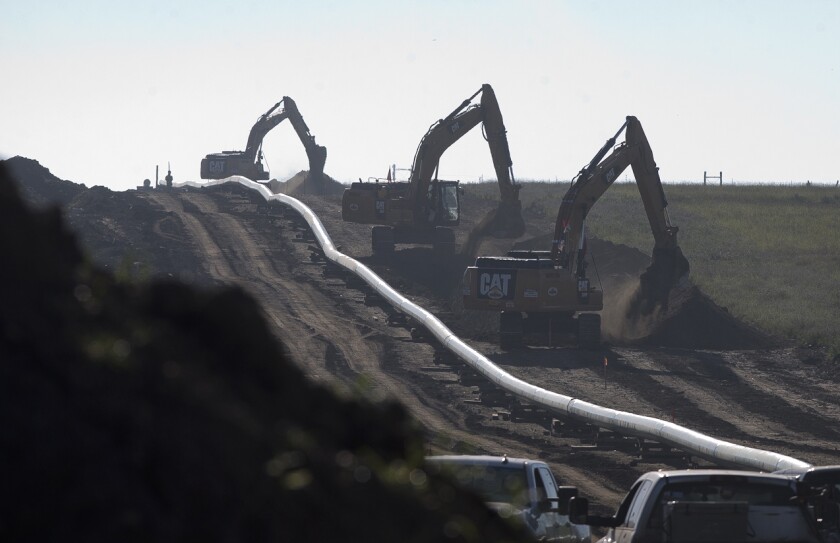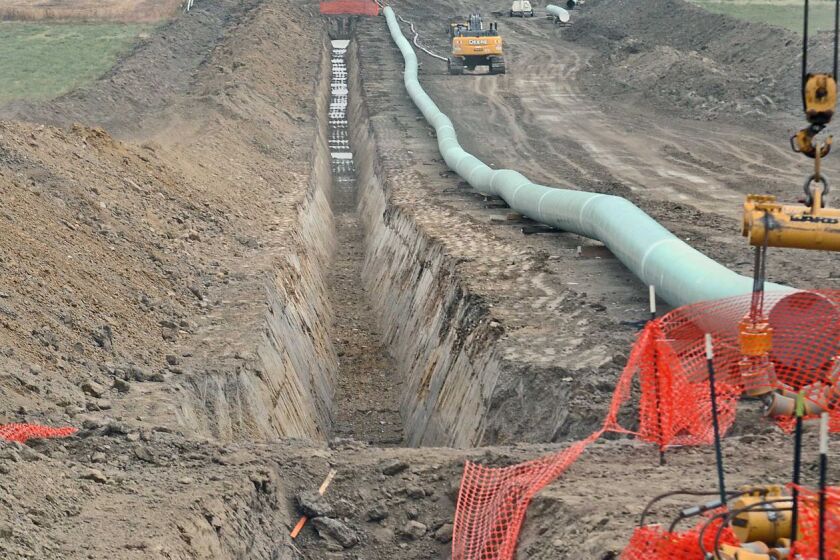BISMARCK — The same federal judge who almost a year ago ordered an immediate shutdown of the Dakota Access Pipeline ruled Friday, May 21, that the embattled project can keep running through the completion of an extensive environmental review.
The much-anticipated decision allowing the pipeline to continue operations even though it lacks a key legal permit comes as relief to a North Dakota oil industry that has been on edge for the better part of a year. It's also a major blow to Indigenous and environmental activists who had hoped that the court's prior position on the pipeline could foreshadow another shutdown order.
ADVERTISEMENT
U.S. District Judge James Boasberg's ruling also comes in the wake of decisions by officials in President Joe Biden's administration to punt on opportunities to shutter the pipeline themselves, leaving its short-term future in the hands of the court.
"The Court acknowledges the Tribes' plight, as well as their understandable frustration with a political process in which they all too often seem to come up just short," Boasberg wrote. But he added that "judges may travel only as far as the law takes them and no further. Here, the law is clear, and it instructs that the Court deny Plaintiffs' request for an injunction."
Last July, Boasberg handed a landmark victory to the Standing Rock Sioux Tribe, which has vigorously opposed the pipeline since its construction began near their reservation in 2016, when he vacated an environmental permit granted by the U.S. Army Corps of Engineers and ordered that the line be emptied of oil. That shutdown ruling was later reversed by a federal appeals court, and the tribes came back to Boasberg with a new shutdown argument, needing to meet a higher legal standard this time around.
In order to win another shutdown order, Standing Rock had to demonstrate that they "will likely suffer irreparable harm in the absence of an order closing the pipeline." Boasberg wrote that the tribe's arguments did "not clear that daunting hurdle."
In a statement, Standing Rock attorney Jan Hasselman expressed disappointment at the result.
“We believe the Dakota Access Pipeline is too dangerous to operate and should be shuttered while environmental and safety implications are studied — but despite our best efforts, today’s injunction was not granted," he said. "The unacceptable risk of an oil spill, impacts to Tribal sovereignty and harm to drinking water supply must all be examined thoroughly in the months ahead as the U.S. Army Corps conducts its review of this pipeline.”
Protests over the construction of Dakota Access near the Standing Rock reservation drew the global spotlight and sometimes turned violent in 2016 and 2017. The Standing Rock Sioux Tribe argues that the pipeline's operations endanger their water supply at its Missouri River crossing just off the reservation.
ADVERTISEMENT
In a statement, Standing Rock Chairman Mike Faith noted that the ruling would allow the pipeline to keep moving oil despite the missing legal permit. "In a nation of laws there is still no justice for Standing Rock. We are disappointed that the powers that be have failed in their proclaimed commitment to environmental justice and ensuring the sanctity of our resources, especially our water," he said. "We will continue our fight until justice prevails."
The court's decision follows arguments by Energy Transfer, which owns Dakota Access, that shutting down the pipeline would deal a devastating economic blow to North Dakota's economy. Dakota Access can carry up to 570,000 barrels of oil a day from the Bakken region to market in other parts of the country, and state leaders and industry officials have been anxiously waiting for decisions from both the Democratic presidential administration and the federal court.
The latest chapter of the Dakota Access battle has also drawn vocal advocacy for its operations from leadership of the Mandan, Hidatsa and Arikara Nation, an oil-producing tribe in North Dakota that exports the bulk of oil off its reservation through the pipeline.
State leaders praised Boasberg's ruling Friday, and North Dakota Petroleum Council President Ron Ness celebrated it as good news for the oil industry and "good news for North Dakota."
"We all understand the importance of American energy infrastructure, and there's absolutely no reason this pipeline can't continue to operate just the way it has, safely and effectively and efficiently," he said.
Ness added that he hopes the judge's decision will mark the end of the road for the shutdown movement.
"It's time to let this pipeline do what it was designed to do," he said. "I think it's time to move on."
ADVERTISEMENT
Standing Rock can still appeal Boasberg's latest ruling, and the judge set a June 11 deadline for both sides to present their plans for any further litigation.
Earlier this year, the state of North Dakota sought to intervene in the pipeline case to bolster arguments in favor of its operations. Boasberg denied that request on Friday in a procedural decision clearing the deck for his ruling.
Army Corps officials recently said they expect their new environmental review to be finished by March of 2022. Energy Transfer has challenged the need for the review and announced plans earlier this year to appeal the mandate up to the U.S. Supreme Court.
State regulators and pipeline operators have been looking to nearly double the capacity of Dakota Access. An Energy Transfer executive said this month that he expects that expansion to be complete before the end of this year.
Readers can reach reporter Adam Willis, a Report for America corps member, at awillis@forumcomm.com.









